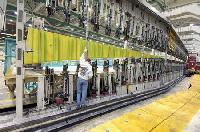Boeing [NYSE: BA] mechanics began major assembly of the new 777 Freighter at the company’s Everett, Wash., facility. The 777 Freighter will fly farther and provide more capacity than any other twin-engine cargo airplane.
„We are excited to begin production of the 777 Freighter so we can put the airplane into service with our customers,“ said Larry Loftis, vice president, 777 Program, Boeing Commercial Airplanes. „The 777 Freighter’s unmatched range, efficiency and capacity as a twin-engine cargo airplane will significantly enhance our customers‘ ability to deliver freight.“
Workers took the first step in major assembly for the new 777 Freighter by loading its 97-foot-long wing spar into a tool that automatically drills, measures and installs more than 5,000 fasteners into the spar. The spar is the internal support structure that runs through the full length of the wings and provides support to the wing.
The first 777 Freighter will be delivered to launch customer Air France in the fourth quarter of 2008. „Our vision to develop the 777 Freighter as the world’s most capable twin-engine cargo airplane is now becoming a reality with the start of major assembly,“ said Kim Pastega, deputy program manager and engineering leader, 777 Freighter Program. „Our customers and suppliers worked closely with us to reach this important milestone.“ In addition to its unmatched range and capacity, the main cargo-deck door of the 777 Freighter is sized to facilitate easy direct-transfer shipments with the 747 freighter fleet, which provides about half of the world’s freighter capacity.
Pastega said the 777 Freighter has been well received by the marketplace, with a customer base that includes traditional cargo carriers and leasing operators. To date, Boeing has sold 80 777 Freighters to 11 customers, accounting for more than 20 percent of the 777 Program’s current backlog.
The 777 Freighter is based on the 777-200LR Worldliner passenger airplane and will be built along the same production line as all other models of the 777. Some of the changes in manufacturing for the 777 Freighter include installation of items such as the main-deck cargo door; a new monolithic aluminum floor; an enhanced, lightweight cargo-handling system with built in test equipment that continually monitors the operational health of the system; and a rigid cargo barrier located in the forward section of the airplane.
Other design changes to the 777 Freighter include the strengthening of certain airplane structure, a maneuver load alleviation system to help distribute the load on the airplane in flight and the removal of certain passenger-related items such as windows and doors.
The 777 Freighter will have a range of 4,885 nautical miles (9,045 km) with a full payload and general cargo market densities. With a maximum takeoff weight of 766,000 pounds (347,450 kilograms), the 777 Freighter will have a revenue payload capability of more than 226,000 pounds (103 metric tons).
The 777 Freighter is the sixth and newest model of the 777 family of airplanes. The airplane will be powered by the GE-90-110B1L engine.
The 777 family of airplanes is the market leader in the 300-to-400-seat segment and is preferred by airlines around the world because of its fuel efficiency, reliability and spacious passenger cabin. To date, Boeing has received more than 1,040 orders for the 777 from 55 customers worldwide.
Photo: Boeing






